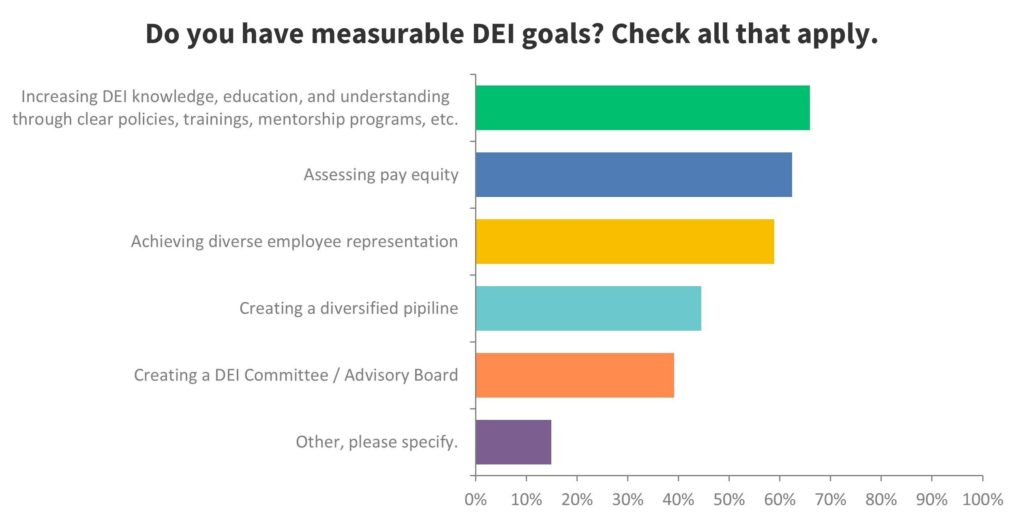A new survey has revealed a solid corporate commitment to the ideal of a fair and equitable workplace, despite the fact that diversity, equity and inclusion (DEI) has become a hot issue in today’s political landscape.
A telling sign is that 41% of respondents said that DEI progress is a measurable objective for their organisation’s leadership team, according to the Salary.com survey. The report also acknowledges the many positive business outcomes that DEI can achieve. In fact, many HR professionals credit it for improved employee engagement/satisfaction and greater access to talent.
The survey also demonstrates that more progress is needed. This is despite the fact that DEI has gained a strong foothold in over half of US companies. Still a nascent business process, only a third of organisations have a DEI budget. Additionally, less than half have someone designated to DEI. Of those, 41% have been in the role for 1-2 years.
MEASURABLE DEI GOALS

For organisations where there is accountability for DEI success, the top two measurable goals are increasing DEI education and assessing pay equity. The rise of pay equity assessments is indicative of the many states that have enacted pay transparency and equal pay legislation, and the rising number that have legislation pending.
VALUING DIVERSE WORKFORCES
A significant value is placed on having a diverse workforce, with a third of organisations now conducting a diversity audit. Achieving a diverse workforce is a complicated process, and the vast majority of respondents are leveraging technology to realise diversity:
- 89% are leveraging tech to enhance recruiting processes.
- 77% are leveraging tech to create of job descriptions.
- 65% are leveraging tech for pay equity.
In addition to technology, more than a third of HR professionals are building a diverse recruitment pipeline via partnerships with Historically Black Colleges and Universities (HBCUs), minority professional and MBA organisations/associations.
AFFIRMATIVE ACTION RULING IMPACT
“Given the Supreme Court’s recent ruling on affirmative action, some retrenchment around DEI can be expected,” said Lenna Turner, Head of DEI for Salary.com. “Yet, this survey makes clear that most HR practitioners appreciate that DEI principles can positively impact innovation, employee morale, customer satisfaction and the bottom line. As often happens with transformative change, corporate actions are lagging their intentions. But there are also many corporate leaders who are boldly leading the way. And I am confident that other organisations will follow. To be competitive, they will have no choice.”
HR professionals cited a lack of time and resources as the biggest challenge to advancing their DEI efforts. This was followed by access to sufficient budget, employee participation and leadership accountability and buy-in. Most measure their progress by the number of diverse employees. In the “other” category respondents listed: reduction of any presented pay equity concerns, as well as employee engagement and racial equity surveys.
The survey assesses the current state of DEI from 600+ US-based HR professionals , representing 20 industries. Click here to read more.






































